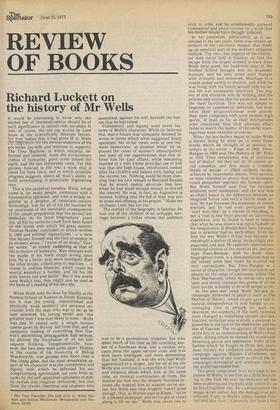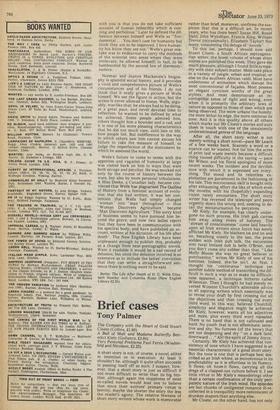REVIEW OF BOOKS
Richard Luckett on the history of Mr Wells
It would be interesting to know why the second law of thermodynamics should be of such significance to second rate novelists. It was, of course, the red rag waved by Lord Snow at the scientifically illiterate literati, butt innp before that it. had given H. G. Wells tids. inspiration for the serious undertow of his pot-boiler (ex-wife and mistress to support), The Time Machine, in which mutants, deformed and imbecile, mark the evolutionary climax of humanity, giant crabs inherit the earth, and the sun inexorably cools. Yet this gloomy forecast is slid into a work that is never far from farce, and in which scientific progress suggests, above all, man's ability to build entertaining, if potentially frightening toys.
This is the perpetual paradox. Wells, whose name is, for many people, consonant with a fundamental optimism, and who is widely regarded as a prophet of twentieth-century technology, was for all of his life haunted by an awareness of the inevitable consequences of the simple proposition that the second law embodies. As his latest biographers ' point out, all his lay sermons could have been based on the words with which his great mentor, Thomas Huxley, concluded an article written in 1889 and entitled 'Agnosticism ' — a term that Huxley himself was the first to employ in its modern sense. "I know of no study," Huxley wrote, "so utterly saddening as that of the evolution of humanity. Man emerges with the marks of his lowly origin strong upon him. He is a brute, only more intelligent than the other brutes, a blind prey to impulses ... a victim to endless illusions, which make his mental existence a burden, and fill his life with barren toil and battle." But if the words were Wells's text, they might also be used as the basis of a reading of his own life.
When Wells held the door for Huxley at the Normal. School of Science in South Kensington it was the young, impoverished and physically weak student's one personal encounter with the man who was to be, as he later admitted, his lasting model and .• the greatest man 1 was ever likely to meet '. Wells was able to attend only a single lecture cautse given by Huxley, but from that, and an assiduous reading of everything that Darwin's astonishing propagandist had written, he derived the foundation of all his subsequent thinking. Temperamentally, however, the two men were poles apart. Huxley, in the course of his trouncing of Bishop Wordsworth, was goaded into more than few cheap gibes, but the most remarkable aspect of his character was the consistency and dignity with which he defended his uncompromising agnosticism not only from attacks by the self-appointed upholders of public morals and religious orthodoxy, but also from the cranks, libertines and utopians who
assembled, against his will, beneath the banner that he had raised.
Consistency and dignity were never features of Wells's character. While he believed that man's future was ultimately doomed he wrote in terms which often suggested heady optimism; his social views were at one moment democratic, at another elitist; he espoused the cause of women's emancipation, and used all the opportunities that this offered him for easy affairs, while remaining married to a wife whose principal use to him was that she kept house, entertained, looked after the children and helped with typing and the income tax. Nothing could be more damning than his own remark to Bertrand Russell that he would openly advocate free love when he had made enough money to live off the interest. He was, in fact, an Augustine in reverse, holding that the fall of man was still to come and offering as his prayer, "Make me unchaste, Lord, but not yet."
The outline of the biography is familiar. He was one of the children of an unhappy marriage between a father whose real ambition
was to be a professional cricketer, but who spent much of his time as the unwilling keeper of a hardware shop, and a mother who cameirom the upper servant class, and was both more intelligent and more demanding than her husband. It was she who had Wells apprenticed to a draper, and for all of his life Wells was involved in a rejection of her social and religious ideals which was, at the same time, an ironical continuation of them. His mother put him into the drapery business be. cause she wanted him to acquire social status, but Wells saw that drapery wasn't good enough, that, as Minton says in Kipps, "we're in a blessed drainpipe, and we've got to crawl along it till we die." Wells was never one to
stick to cribs, and he unashamedly pursued commercial and social success on a scale that his mother would have thought indecent.
In his pessimism, particularly as it developed in his last years, there was always an element of the calvinistic despair that made up an essential part of his mother's religious outlook. The two vital aspects of his character were never held in balance. At first the escape from the draper seemed to have done Wells little good; his hard-won .stay at the Normal School brought him no academic honours, and his next years were fraught with ill-health and overwork. Marriage to a cousin ended swiftly in divorce, and while he was living with his future second wife his social life was necessarily restricted. The way 'out of this situation was by writing, and the articles and stories that he produced were in the main facetious. This was not simply in response to commercial demands, for even when their prognostications were gloomy they were composed with such evident high spirits, at least so far as their mechanisms were concerned, that their ultimate effect failed to match the horror of the awful warnings they were intended to convey.
When the pot-boilers began to make Wells a decent living he went on to write those works which he thought of as serious attempts at the novel — Kipps in 1905, TonoBungay in 1909 and The History of Mr. Polly in 1910. Their seriousness was of intention not of matter, for they are all, of course, social comedies, and they share a common theme of escape — albeit unlikely escape, achieved by improbable means. They proved, or were intended to prove, that no drainpipe could altogether imprison the human spirit. But Wells himself saw that his fictional solutions were inadequate, and the war was an object lesson in the difference between an imagined future and such a future made actual. He had foreseen the stalemate of _trench warfare, and he had even prefigured the 'land iron-clad ' as a means of breaking it, but a visit to the front proved an unnerving experience, and he found it hard to believe that what he was shown was not a figment of his imagination. It should have been salutary, but in practice had no such effect. Even before the war Wells's fiction had 'become increasingly a matter of ideas, increasingly propagandist and arid. He explicitly rejected conventional notions of the novel as art, and perhaps Tono-Bungay, with its loose autobiographical form, is a demonstration that he did indeed work best when he evolved his , own conventions. But Tono-Bunguy is a novel of character, though the characters are always on the verge of caricature, whilst The New Machiavelli, which he wrote two years later and which contains the germs of all his later novels, is hardly to do with people at all.
In the post-war years Wells became increasingly interested in projects such as The Outline of History, which finally gave him financial independence. It was hardly an encouraging time to embark on such endeavours; the euphoria of the early twenties soon changed to something sinister and destructive; evolution was scarcely a nostrum to prescribe in the face of the depression and the rise of Fascism. The recognition of this truth is the key to an understanding of Wells's final years, during which he viewed the world with mounting gloom and depression. Some of the battles which he fought in these last years, most notably his vindictive and unprofitable campaign against Roman Catholicism, are sad reminders of the extent to which his increasingly .theoretical and arbitrary view of
the world had misled him.
The great temptation is to succumb to the pathos of Wells, to see him as a little boy crying in the dark because his meccano set has been scattered and the bolts with which it can be fitted together lost. To a certain extent the image is not unfair, but the damage was selfinflicted. Early in Wells's Career Joseph Conrad told him that: " Generally the fault I find
with you is that you do not take sufficient account of human imbecility which is cunning and perfidious." Later he defined the difference between himself and Wells as "fundamental ... You don't care for humanity but think they are to be improved. I love humanity but know they are not." Wells's great mistake was to endeavour to carry the methods of the scientist into areas where they were irrelevant; he allowed himself, in fact, to be bamboozled by the second law of thermodynamics. ,
Norman and Jeanne Mackenzie's biography is splendid social history, and it provides a vivid and comprehensive picture of Wells's circumstances and of his friends. I do not think that it really gives a picture of Wells himself. We see the figure in action, but the action•is never allowed to freeze. Wells, arguably, was like that; he always had to be doing, at a great pace, and never devoted time to reflection; he wanted to be defined by what he achieved. Some people admired him, others thought him a bounder and a cad, and it is one of his more pleasing characteristics that he did not much care, until late in life, how people felt. But indifference to the way in which others saw him cannot excuse his failure to take the measure of himself, to judge the imperfection of the instrument by which he assessed the world.
Wells's failure to come to terms with the appetites and vagaries of humanity at large was visited back on him in ways that were both savage and peculiar. He was mocked not only by the course of history between the wars, but also by more personal tribulations. A Miss Deeks, a Canadian lady, became convinced that Wells has plagiarised The Outline of History from a feminist account of evolution that she had written; it was her contention that Wells had simply changed ' woman ' into ' man ' throughout — thus ' Woman Discovers Agriculture' became 'Man Discovers Agriculture.' This sorry kind of business seems to have pursued him beyond the grave, and now two ladies report that they have been in communication with his spectral body, and have published an account, written at his dictation, of his life after death .. The New English Library have been unpleasant enough to publish this, probably' as a change from near-pornographic novels. Were it readable it would be a sad record of delusion, but since the delusion involved is so extensive as to include the ladies' conviction that they can write a straightforward sentence there is nothing more to be said.
Bertie: The Life After Death of H. G. Wells Elizabeth Hawley and Columbia Rossi (New English Library E2.50)



































 Previous page
Previous page